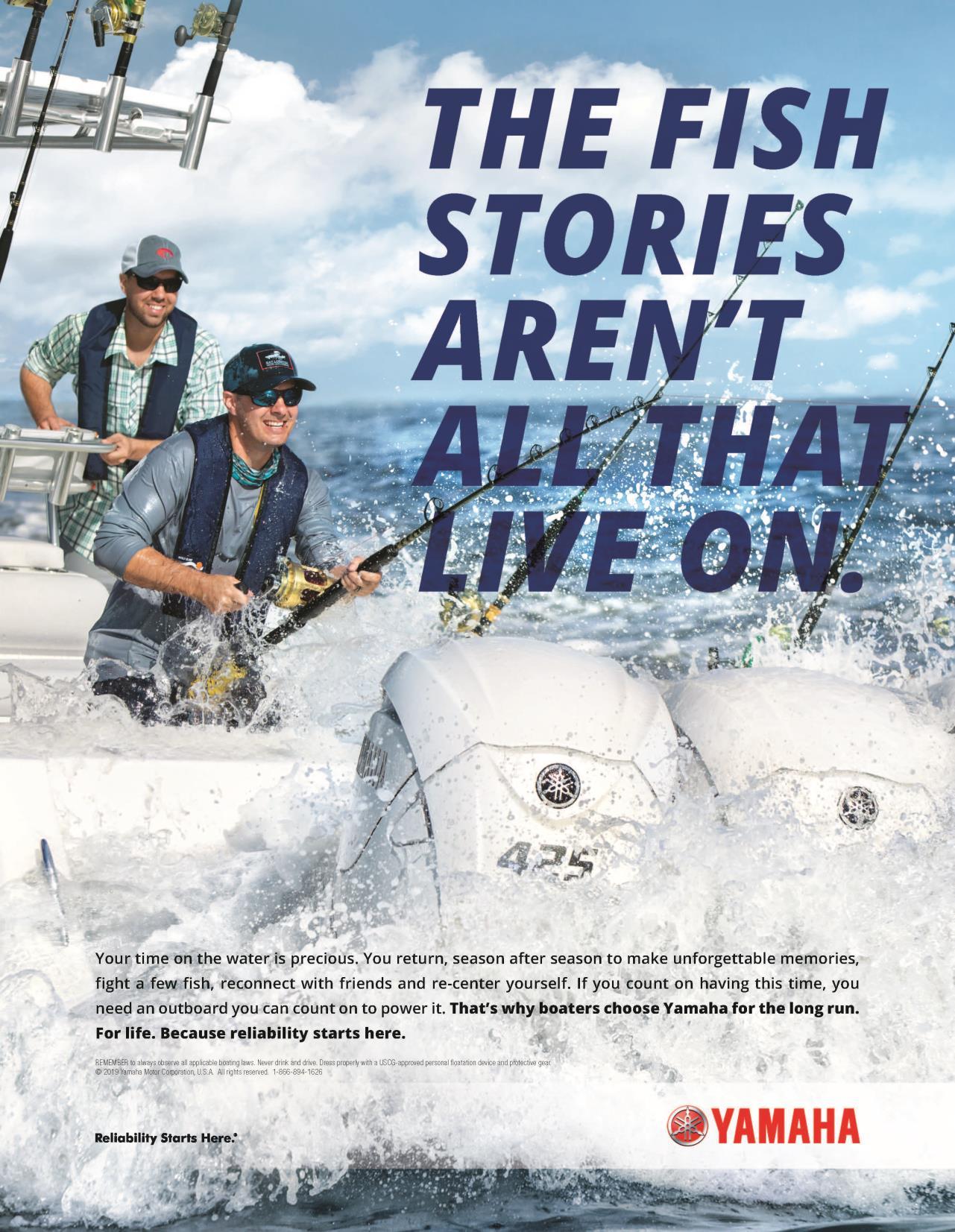
10 minute read
Commentary: Just What
Commentary by John DePersenaire, RFA Managing Director Fishery Management Plan Specialist
Just What Constitutes Seafood?
Advertisement

This idea that the commercial sector owns the to GDP, harvest, and on and on, but for some reason, word seafood has been bugging me since Secevery administration fails to see that recreationally retary of Commerce Ross took aim at the US Seafood harvested fish are indeed seafood. Clearly, the word deficit back in 2017 and committed to closing that seafood carries political weight and I understand the gap. Never once did he look to the recreational seccommercial sector probably wants to retain the polititor in this work despite every definition of seafood I cal advantage of owning the word. But nothing I can find clearly includes fish and shellfish harvested have found in extensive research and none of the defby recreational anglers. If you missed it, NOAA issued initionsIhaveseenforseafoodexcludefishlandedby a notice in the federal register seeking recommendarecreational anglers from the definition. Add to that tions for a comprehensive interagency seafood trade the fact that I am not thrilled about the approach Secstrategy. Both the Executive Order from President retary Ross seems fixed on for closing the seafood Trump in May, and now this more recent announcegap. His plan is basically to export more US caught ment, failed to even mention recreational fishing and seafood and to ramp up aquaculture, which is a very that annoys me to no end. Commercial fishermen narrow approach. With all that in mind, I assembled aren’t the only ones that provide seafood or feed the the following comments to submit to the RFI on benation. Recreational fishermen are comparable on half of the RFA. just about every level; sales, jobs, income, contribution John DePersenaire
July 15, 2020 RE: RFI Response: Interagency Seafood Trade Task Force Dear Members of the Interagency Seafood Trade Task Force:
Please accept the following comments on behalf of the Recreational Fishing Alliance (RFA) in regard to the request for information issued by the Interagency Seafood Trade Task Force. RFA is a national organization with a mission statement to fight for the rights of saltwater anglers, protect marine and fishing tackle jobs and ensure the long-term sustainability of our Nation’s marine resources. RFA recognizes the importance and traditional value of US commercial fishermen and what they provide to this council in terms of food production and jobs. RFA aims to maintain working relationships with individual commercial fishermen and commercial fishing organizations in order to work constructively through issues important to both our sectors. RFA also recognizes the intent of Executive Order 13921 issued by President Trump on May 7, 2020. RFA is particularly supportive of the statement in section 1 to “get more Americans back to work and put healthy, safe food on our families table.” The U.S. fisheries are the best managed in the world and RFA believes it is appropriate for the Administration to make investments for
the benefit of U.S. fishermen.
Specific to key sections of Executive Order 13921, RFA supports Section 2 (a) that seeks to “identify and remove unnecessary regulatory barriers restricting American fishermen and aquaculture producers.” While RFA agrees that U.S. fishermen are subjected to unnecessary regulatory barriers, RFA is cautious about advancing aquaculture producers too rapidly. Aquaculture development, particularly ocean based facilities, hold potential negative impacts to important habitat and native fish stocks and these important issues should not be glossed over until fully vetted. RFA supports NOAA remaining the lead federal agency and conducting the appropriate environmental impact statements under NEPA for all aquaculture facilities proposed in the marine area. RFA supports Section 2 (b) to combat illegal, unreported and unregulated fishing (IUU). RFA and the recreational fishing community have been at the forefront of requesting the U.S. government take a firm stance through international fishing treaties to curb IUU fisheries. The fairness aspect aside, which should be plainly apparent, there are serious conservation impacts that result from IUU fishing and impact domestic commercial and recreational fishermen. The obvious impact is the reduction of available quota and fishing opportunities for U.S. fishermen.
RFA supports Section 2 (e) that seeks to safeguard our communities and maintain a healthy aquatic environment. Fishing communities are essential for both commercial and recreational fishermen to access our marine resources. Fishing communities include tackle shops; marinas that hold private, for-hire and head boats; piers; boat ramps; and water access points. All are essential in ensuring that the American public has adequate opportunities to access U.S. fisheries. It also goes without saying that a healthy aquatic environment is critical to many species critically important to both commercial and recreational fishermen. RFA does not support the roll back of any environmental laws, regulations, or review processes that would result in a net degradation of our nation’s estuaries, rivers, bays, waterways and oceans.
Where the RFA finds fault with Executive Order 13921 and recent notices to enact the mandates of EO 13921, is the conscious decision to exclude recreational fishing in achieving the goals of the order. In our review of multiple definitions of seafood, in no instance did they exclude fish harvested by recreational anglers. The most common definition of seafood includes some variant of the following definition; “any shellfish or finfish from the sea used for food.” None of the definitions we have seen restrict the definition of seafood to shellfish or finfish caught by commercial fishermen or commercial fishing gear. Therefore, a summer flounder, blue crab, bluefin tuna, or Atlantic cod landed by a recreational angler is just as much seafood as these same species landed by commercial fishermen.
EO 13921 fails to define seafood for use in this executive order or for actions that will be taken to advance its objectives. Therefore, it can be assumed that any one of the myriad of definitions for seafood in popular use could be used with this executive order. RFA sees absolutely no reason that fish landed by recreational anglers should not be considered seafood. Based on every definition we have reviewed, seafood is not a term that can be assigned exclusively to the commercial fishing industry. Furthermore, EO 13921 speaks about actions suggested to benefit U.S. fishermen. Fishermen is a broad term that covers all individuals that catch or attempt to catch animals from the marine environment. The term fisherman is not sector specific. No one would ever suggest that the term fishermen excludes anglers that fish for recreation or personal consumption. Thus, all benefits, goals and objectives outlined in EO 13921 to benefit fishermen must include both commercial and recreational fishermen.
RFA points this out because it is extremely disappointed that EO 13921 does not recognize the contributions that recreational fishing makes towards providing the U.S. public with fresh, domestic caught seafood. While not all recreational fisheries have a significant consumptive component such as marlin, sailfish and some other ‘sport’ fisheries, the primary motivation for many anglers is to consume their catch. From an economic standpoint, recreational fishing generates income, supports jobs and contributes the gross domestic produce just as commercial fishing does. RFA can find no rational reason why recreational fishing should be excluded from this effort by the Administration to “promote American seafood competitiveness and economic growth.” In fact, RFA finds it insulting and disappointingly consistent with a long and unfortunate bias against the recreational fishing industry by NOAA Fisheries under previous Administrations.
In terms of staff, research dollars, and management funding, the U.S. Department of Commerce and its subordinate agencies such as NOAA Fisheries, have historically prioritized commercial fishing interests over that of the recreational fishing industry. RFA and many in the recreational fishing industry had hoped this Administration would undo this institutional bias that has placed the interests of the commercial fishing industry over that of the recreational fishing industry. We had hoped that this Administration would put both of these sectors on equal standing and acknowledge the important role that both play in providing the United States public with domestic seafood. It is our expectation that these com-
ments will spur the Administration to reflect on this oversight and provide equal interest. Perhaps the White House and the newly created Interagency Seafood Trade Task Force are not aware of the magnitude in terms of jobs, landings and economic output of the US recreational fishing industry. According to the National Oceanic and Atmospheric Administration, the most recent economic estimates of recreational saltwater fishing include 472,000 jobs, $68 billion in sales and $39 billion in total contributions to gross domestic product. When compared to similar categories attributed to the commercial fisheries, the recreational values represent over one third of the combined US fishing output. In terms of landings, recreational anglers are estimated to have landed 334,907,475 pounds of seafood in 2019. In the same year, the recreational sector is estimated to have released over 600,000,000 pounds of fish. These discards can be classified in several ways including regulatory discards (below or above a minimum/maximum size limit, above a bag limit, out of season), or a personal decision made by the angler to release the fish. Based on these numbers, in no way should recreational fishing be considered insignificant or excluded when crafting domestic seafood policy. As to the RFI, RFA offers the following response to question 1. The remaining 6 questions are not relevant to the recreational sector and again demonstrate the bias towards the commercial sector. These questions also demonstrate a very narrow focus put forward by the Administration to address this issue solely by increasing the export of more domestically caught seafood. RFA believes is not the ideal solution for a whole host of reasons and in fact, this approach may exacerbate pressure on certain species and have broad ecological consequences. Recreational angles do not export any fish they land. Thus, every pound of fish harvested by recreational angler remains and is consumed in the U.S. These landings estimates should be applied toward the total domestic seafood production on an annual basis. As explained above, recreationally landed fish fall under every definition of seafood and this acknowledgment alone will help in closing the seafood deficit.
Given that the questions put forward in the RFI are primarily focused toward commercial fisheries, RFA would like to offer additional comments for the Task Force to consider as it works towards the development of a Comprehensive Interagency Seafood Trade Strategy. 1) The harvest attributed to recreational anglers on an annual basis is significant. What is unique about these landings is that they result from low impact, hook and line gear. The magnitude of landings are only possible when the number of recreational participants is high. Appropriate regulatory frameworks for popular, healthy fisheries can help spur interest in these fisheries and drive more participation. This would help close the seafood gap. 2) International management and compliance has a significant impact on U.S. recreational fishermen and the businesses and jobs supported by recreational fishing. RFA suggests the U.S. State Department and Commerce Department take more aggressive action through international fisheries treaties where U.S. fishermen are disadvantaged due to IUU, noncompliance, misreporting, and lack enforcement by other contracting parties. These actions often result in lower overall quotas which in turn result in less opportunities for recreational anglers, lower recreational harvest and economic output. 3) Explore ways to reduce regulatory discards in the recreational sector and convert mortality associated with discards to harvest. The idea is to find conservation neutral solutions that will increase the potential for recreational harvest without resulting in a net increase of overall mortality. 4) Review all federal laws that hold jurisdiction over the management of recreational saltwater fisheries and make suggestions for changes that would allow greater recreational access to U.S. marine resources while ensuring longterm sustainability. 5) Explore ways to increase recreational participation. Increasing recreational participation, in concert with some of the above mentioned suggestions, will allow for increased recreational harvest without the unwanted consequences of highly efficient or destructive fishing gear. In closing, RFA believes it is paramount that the Administration acknowledge that fish and shellfish harvested by recreational anglers is seafood. Perhaps this acknowledgement will help end the decades long institution bias against the recreational fishing industry and help achieve the Administration's goal of closing the U.S. seafood gap which the RFA supports under certain scenarios.
RFA strongly encourages the Administration to include the interests of the recreational fishing industry and the important role it can play in the goals and objectives of the Interagency Seafood Trade Task Force and the forthcoming Comprehensive Interagency Seafood Trade Strategy. Thank you for your consideration and our industry looks forward to providing input towards this important work.












